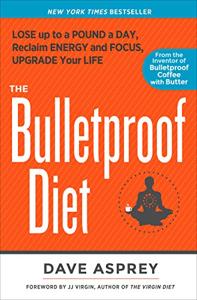
Want to learn the ideas in Bulletproof Diet better than ever? Read the world’s #1 book summary of Bulletproof Diet by Dave Asprey here.
Read a brief 1-Page Summary or watch video summaries curated by our expert team. Note: this book guide is not affiliated with or endorsed by the publisher or author, and we always encourage you to purchase and read the full book.
Video Summaries of Bulletproof Diet
We’ve scoured the Internet for the very best videos on Bulletproof Diet, from high-quality videos summaries to interviews or commentary by Dave Asprey.
1-Page Summary of Bulletproof Diet
Overview
Dave Asprey recommends that you put butter in your coffee. He claims this will help you lose weight and feel better overall, as well as improve your brain function.
The Bulletproof Diet is comprised of eating a lot of vegetables and healthy fats, moderate amounts of proteins and carbohydrates, and very little toxins or starch. But the diet isn’t just about what you eat; it’s also about how your body works and why certain foods are good for you. It’s about understanding that fat can be good as long as they’re the right kind. The diet is also about learning to fast properly so that it doesn’t hurt your body in any way.
This passage explains why people are putting butter in their coffee and how it can improve your health. It also reveals the dangers of moldy coffee beans and the benefits of grass-fed meat. Eating more fat increases brain function, which makes you think faster.
Big Idea #1: Most coffee contains mold toxins, which are harmful to your health.
A lot of people drink coffee in the morning instead of eating breakfast. However, they may not know that caffeine is actually a toxin and can be detrimental to your health by preventing you from absorbing nutrients.
Most people are exposed to toxins in their food every day. These toxins are difficult to detect and invisible with the naked eye.
Coffee beans naturally carry mold toxins. In fact, one study found that over 90% of the coffee beans were contaminated with mold before they were processed. Another study showed that nearly 50% of brewed coffees contain mold. Several countries have implemented regulations to ban coffee with a high amount of toxins; however, the U.S and Canada haven’t set any limits on this so it’s likely that those countries’ coffees contain more mold than others’.
Mold can lead to many serious health problems, including cardiomyopathy, cancer, hypertension and even brain damage.
So, it’s important to pay attention to where you buy your coffee. If you buy cheap coffee from a bad company, then there is a higher chance that the coffee will contain harmful toxins.
Coffee is a very popular drink. It’s commonly believed that decaf coffee has less mold than caffeinated coffee because caffeine acts as an antifungal agent and prevents mold from growing on the beans. However, it turns out that there are actually more molds in decaf coffee than in regular coffee because of the way decaffeination is done. To prevent exposure to mold, you should buy single-origin coffees instead of blended ones and purchase your coffee from shops that use their own roasters or at least roast their own beans if possible rather than buying preground blends.
Big Idea #2: Drink your coffee with a bit of butter.
You don’t have to give up coffee entirely, but you can drink it in a healthier way. Coffee has many benefits: it blocks inflammation and regulates insulin sensitivity, which helps with weight loss. You can intensify these benefits when you add unsalted butter from grass-fed cows to your morning cup of coffee.
Why switch your milk for butter? Milk impedes the absorption of polyphenols, which are good antioxidants.
Butter contains butyric acid, which reduces inflammation and heals the gut. In addition to this, butter also has vitamin A, which is important for your vision.
Rats who ate high-fat diets and drank coffee lost weight and had less fat.
You can also reach ketosis by adding fat to your coffee. Medium-chain triglycerides (MCTs) are fats that help you burn more fat for energy instead of sugar. MCT oil is made from coconut or palm oil and has 18 times more MCTs than regular coconut oil. You can add butter or MCT oil, or both, to your coffee to help you burn off more fat as an energy source.





